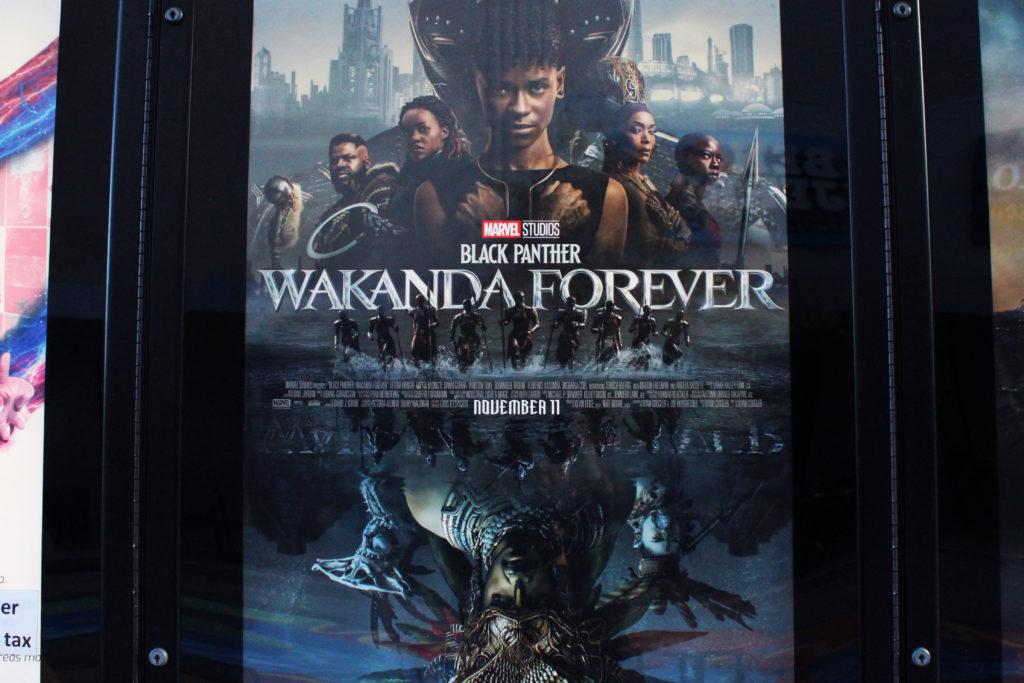The long-awaited sequel to Marvel’s iconic “Black Panther” was released in theaters Friday, arriving two years after the death of Oscar nominee Chadwick Boseman, who played superhero and King T’Challa.
“Black Panther: Wakanda Forever,” tells more than just a comic book story. Through the star-studded cast’s heartfelt performance of a reverent script, audiences are immersed in a film that, above all else, celebrates the life and continues the legacy of a king.
The first film of the franchise, “Black Panther,” premiered in 2018, becoming an international sensation and breaking box office records. The film grossed $202 million on its opening weekend alone and went on to earn multiple Academy Award nominations. But what drew me and many others to the theater two years ago was the promise of seeing Boseman become the first Black superhero to have their own franchise and headline the big screen. “Black Panther” became one of the few blockbuster films in history to feature an all-Black ensemble while selling out theaters around the globe.
But most importantly, Black Panther became an icon for young children of color who had yet to see a hero who looked like them on screen. The character set a precedent for the on-screen portrayal of more superheroes of color, like Spiderman Miles Morales, Moon Knight and Ms. Marvel, who kids could look up to, continue to be empowered by and aspire to embody as they grew up. So when Boseman passed away August 2020 after fighting a private battle with colon cancer, audiences and writers alike were especially cognisant of what a sequel would mean for the legacy of such an inspiration.
How does one celebrate life while it’s the loss they’re grieving? Who inherits a legacy? Who has to step up to protect your own when your people are under attack? These are questions filmmakers posed to audiences while telling the story of “Black Panther: Wakanda Forever” knowing full well they transcended far beyond the cinematic universe.
Writers and actors of “Black Panther: Wakanda Forever” intentionally celebrate Boseman’s legacy through the modem in which he touched the lives of so many – through film, through acting and through Black Panther. As the sequel parallels the loss of King T’Challa with the real-life loss of Boseman, cast members like Letitia Wright, Angela Bassett, Danai Gurira and Lupita Nyong’o give outstanding performances that leave audiences with a palpable sense of the raw emotion and revere they bring to the screen.
As their respective characters Princess Shuri, Queen Ramonda, Okoye, and Nakia navigate life without T’Challa and the Black Panther, the characters find themselves answering those essential questions about grief, legacy and protecting one’s own. And as old threats, like nations greedy for their protected resources, face Wakanda, and newer ones arise, our favorite Wakandans find ways to overcome in more ways than one.
“Black Panther: Wakanda Forever” introduces a new antagonist named Namor, the Feathered Serpent God, played by Tenoch Huerta, a Mexican actor who has starred in a number of films in Latin American and Spain in addition to Netflix’s Narcos: Mexico. What often sets the “Black Panther” franchise apart from other superhero movies is that the film’s antagonists are products of the realities of historical evils like colonialization, national greed and slavery. Similar to Micheal B. Jordan’s Killmonger, Huerta’s Namor emerges less as a villain and more as an anti-hero, waging war to avenge the enslaved, protect his own and reclaim stolen land.
Huerta gives a stunning performance – in the telling of his origin story, audiences are transported to the gorgeous tropical scenery of ancient Mesoamerica. The sequel also unveils immersive underwater visuals as filmmakers display their talented artistic eye for gorgeous scenes that propel a story full of love, heartbreak and reverence along.
This sequel meets every expectation and reveals some surprises many viewers may not have even anticipated. But one thing was clear when watching the film. “Black Panther: Wakanda Forever” did not just pay homage to a man who was a pillar to the Black Panther universe. It intentionally continued Boseman’s legacy. As Wright’s character Princess Shuri and many others iterate throughout the film, T’Challa is dead, but he is not gone – and neither is the Black Panther.




![The [insert here] improv group asks for volunteers during a skit.](https://gwhatchet.com/wp-content/uploads/2025/02/Slate_2_8_25_KW-1-1200x800.jpg)

